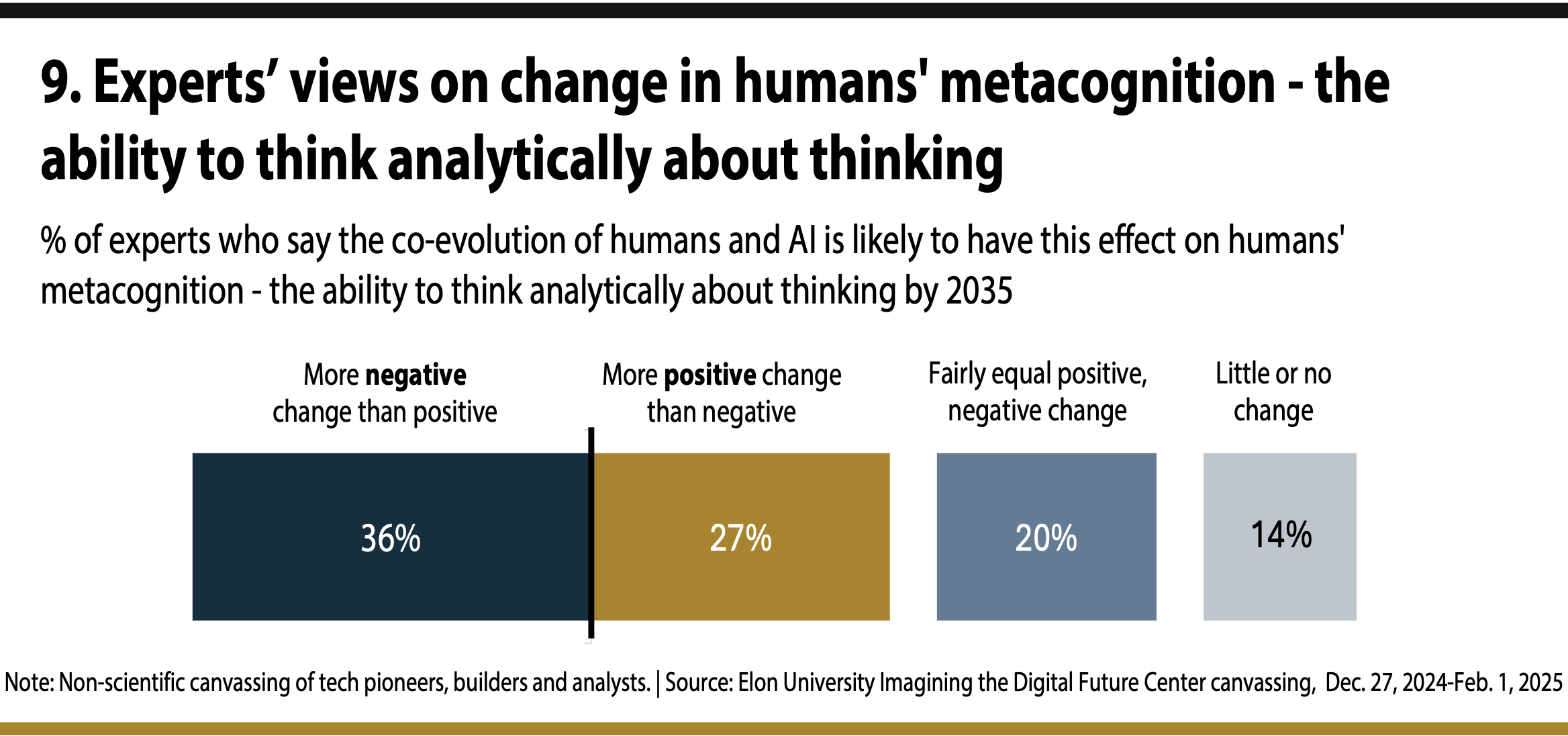
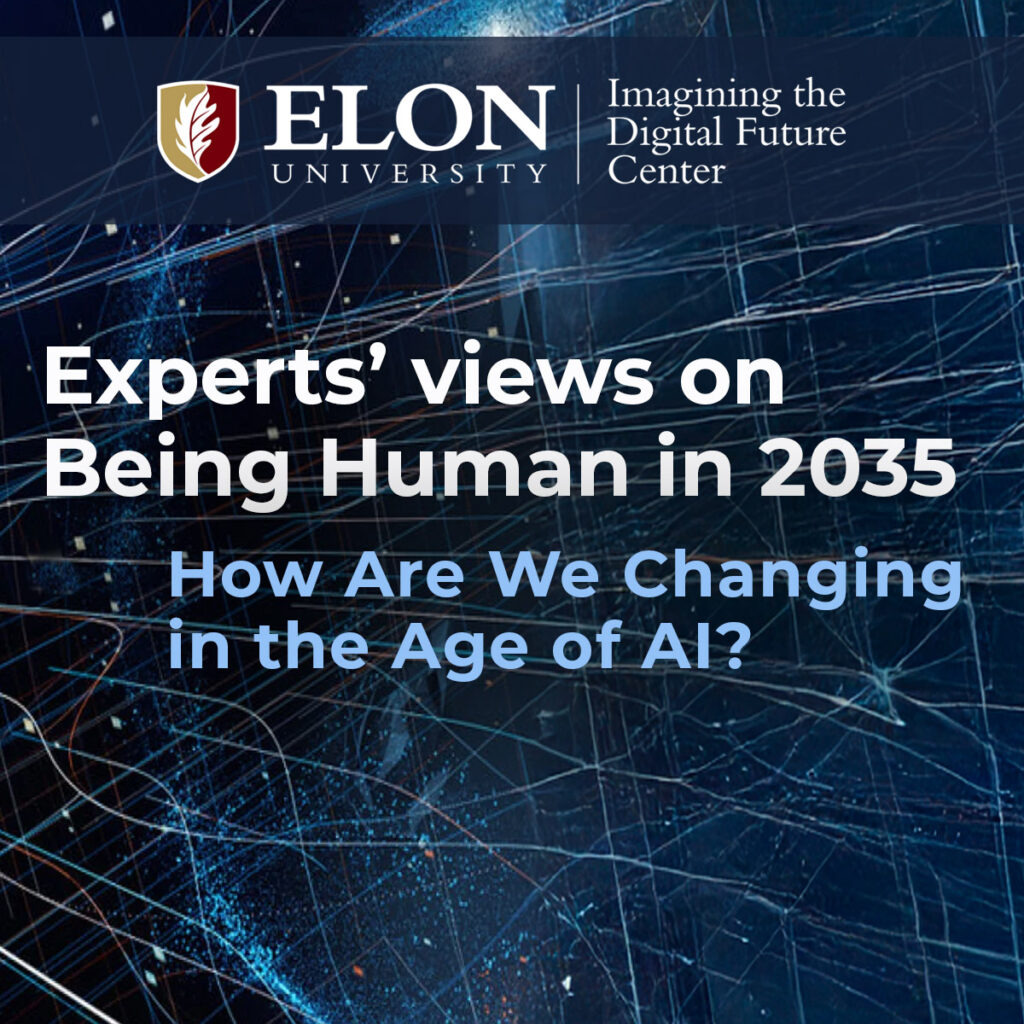
These experts expected in 2025 that by 2035 there will be…
36% – More negative change than positive change
27% – More positive change than negative change
20% – Fairly equal positive and negative change
14% – Little to no change
The contention of those who are anxious about the fate of people’s ability to examine their own assumptions and thought processes goes like this: When AI constantly mediates decision-making, individuals may lose confidence in their own reasoning abilities, struggle with metacognitive monitoring of their own thought processes and default to AI recommendations without critically assessing them. The counter-case some experts make goes like this: AI could serve as a mirror to help people understand their own cognitive biases and thinking patterns. In addition, AI’s aggregation of collective intelligence could expand people’s perspectives, even “how we create understanding itself.” There were comments, as well, about the possibility that machines may become self-aware, even achieving an “artificial consciousness.”
A selection of related quotes extracted from these experts’ longer essays:
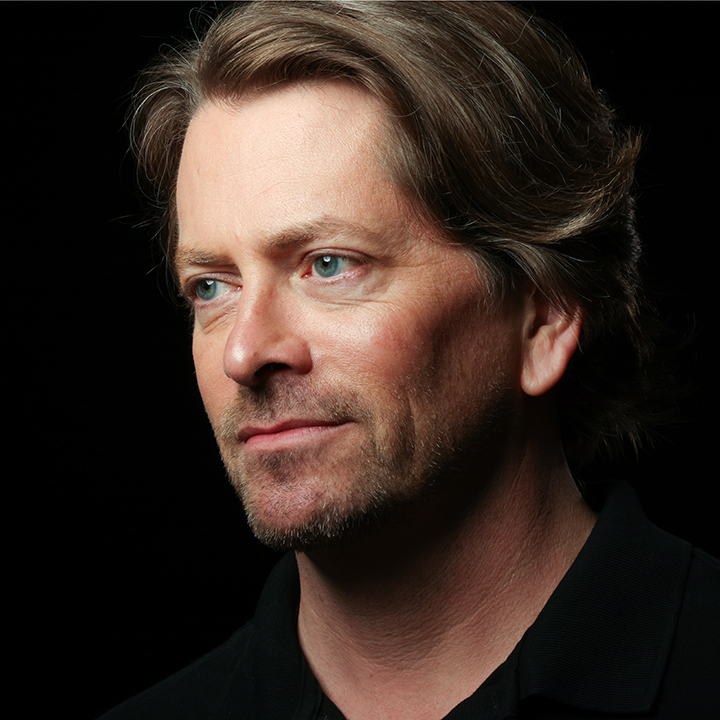
“This transition fundamentally reshapes core human behaviors, from problem-solving to creativity, as our cognitive processes extend beyond biological boundaries to incorporate machine interpretation and understanding. … The emergence of the ‘knowledge-ome’ – an ecosystem where human and machine intelligence coexist and co-evolve – transforms not just how we access information, but how we create understanding itself. AI systems reveal patterns and possibilities beyond human perception, expanding our collective intelligence while potentially diminishing our role in meaning-making. This capability forces us to confront a paradox: as machines enhance our ability to understand complex systems we risk losing touch with the human-scale understanding that gives knowledge its context and value.” – Dave Edwards, co-founder of the Artificiality Institute
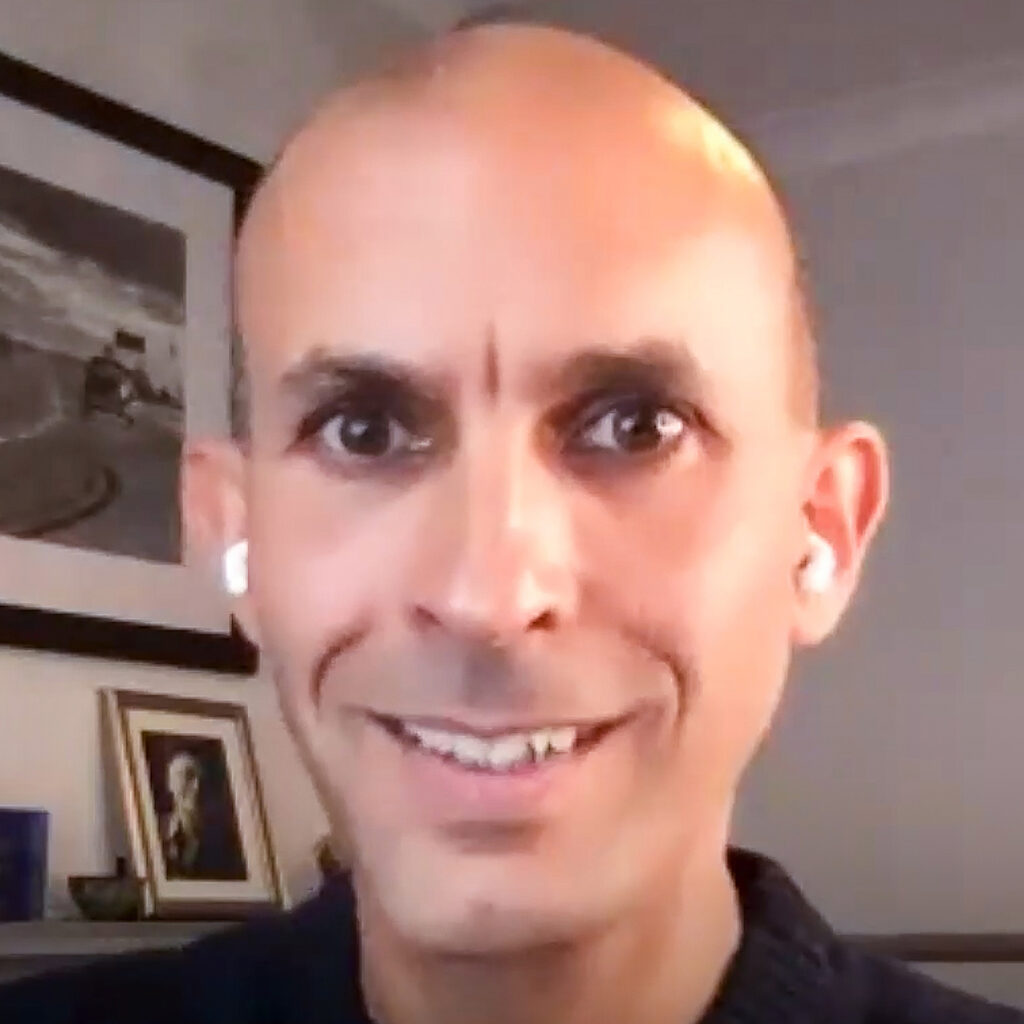
“Being conscious is not the result of some complicated algorithm running on the wetware of the brain. It is rooted in the fundamental biological drive within living organisms to keep on living. The distinction between consciousness and intelligence is important because many in and around the AI community assume that consciousness is just a function of intelligence: that as machines become smarter, there will come a point at which they also become aware, at which the inner lights of consciousness come on for them.” – Anil Seth, professor of computational neuroscience at the University of Sussex, UK, and author of “Being You: A New Science of Consciousness”

“AI is a form of self-inflicted dementia for humans. In the near-term, it may improve the physical condition of humans. But in the long-term it diminishes human cognition. It strips from humans responsibility for the human condition. As AI grows more powerful and commonplace, human cognition will decline. We no longer learn how to remember, analyze, reason or innovate. AI does these for us. … The real danger is that we will pass a tipping point beyond which we cannot retrieve from AI that which makes us human. The dementia will be complete.” – Ken Grady, professor and researcher at LegalRnD – The Center for Legal Innovation at Michigan State University

“Working for us as agents – no longer merely tools that obey our instructions and whims – AI represents humans’ first real extended mind. Not only have we extended the human mind into our tools; that mind is thinking and deciding alongside and sometimes without the humans using it. By all accounts AI will outthink humans. The social, political and economic implications of this powerful intelligence are numerous. Not least of these is how we present ourselves socially, to the world, to our loved ones. We will change as the thing we present – our self – changes from an inner self to an outer, ersatz, crowdsourced self. … Being human will undergo profound changes as AI and the human mind merge; the human mind will integrate with AI. Simply put, there will be more of each of us (AI extensions and digital personas) – who aren’t really each of us. This is radical virtualization. … The essential and existential experience of being human will embrace the AI extension. Wholly unimaginable realities will emerge, with almost no moral or conceptual guidelines. This means that we must begin urgently now to shore up our moral awareness of the far-reaching implications of inviting AI into our lives and minds.” – Barry Chudakov, principal at Sertain Research
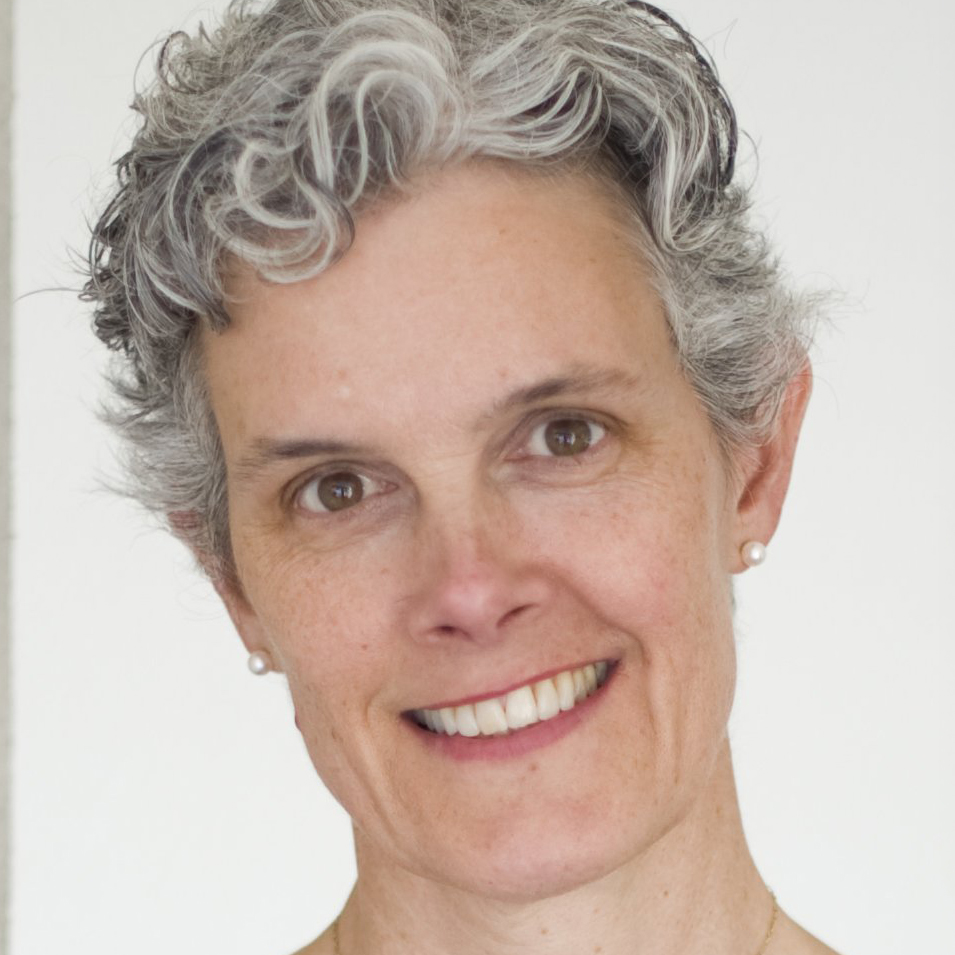
“If we continue adopting technologies largely unthinkingly, as we have in the past, we risk denigrating some of humanity’s most essential cognitive capacities. I am hopeful that the makings of a seismic shift in humanity’s approach to not-knowing are emerging, offering the possibility of partnering with AI in ways that do not narrow human cognition.” – Maggie Jackson, award-winning journalist and author who explores the impact of technology on humanity; author of, “Distracted: Reclaiming Our Focus in a World of Lost Attention”
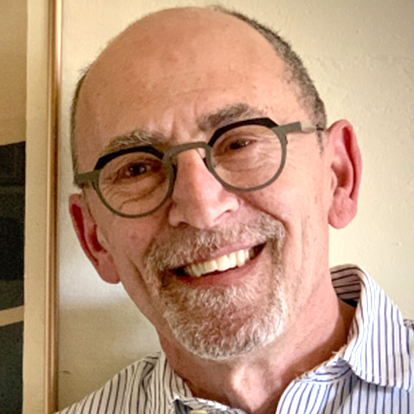
“The experience of being human will be significantly impacted by AI advances in the next decade. … [One serious consequence is our] reconsideration of human exceptionalism. The human self-image has long been tied to an understanding that we are the most cognitively endowed beings in our known universe. With the advent of AI tools that surpass humans in many tasks, this long-cherished self-concept will suffer substantially. Precisely how humans will respond is unknown, but without some sort of support there is real danger that anomie – the breakdown of social norms – and other dystopic sequelae might emerge.” – Peter Reiner, professor emeritus of neuroscience and neuroethics at the University of British Columbia
“If educational systems fail to make transformative progress, which seems likely, then economic forces will continue to replace labor with capital, making AI a substitute for human intelligence rather than a tool to enhance it.”– Danil Mikhailov, director, DataDotOrg


